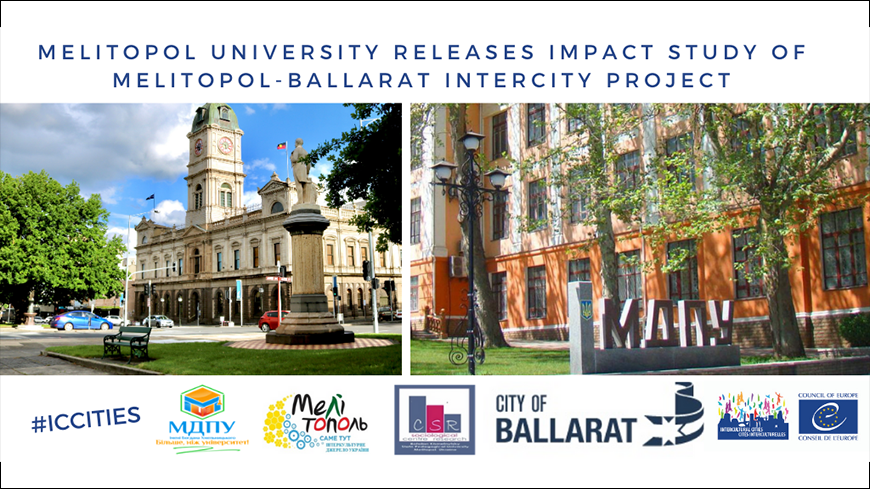As part of the intercity cooperation project “Introducing and Engaging Diversity Globally“, supported with an inter-city grant from the Intercultural Cities Programme, the Centre for Sociological Studies of the University of Melitopol releases an impact study of this relatively short but – as study shows – highly effective initiative.
The project was implemented in July - November 2020 and spread not only to the partner-cities Melitopol (Ukraine) and Ballarat (Australia), but also to their respective national ICC networks, involving the intercultural cities of Melitopol, Lutsk, Odessa, Pavlograd, Vinnytsia, and Sumy (Ukraine), Ballarat, Adelaida, Bacchus-Marsh, Maribyrnong, Melbourne and Melton (Australia), and Hamamatsu (Japan).
The project aimed to contribute to the advancement of intercultural competence skills of city administrators, police, media, minority and religious groups representatives, internally displaced persons and other city residents by offering a series of workshops conducted by local trainers who were formed through a series of online ICC competence seminars – or "trainings for trainers". The impact evaluation of the action was also one of its objectives to ensure added value creation for the participating cities as well as for the ICC Programme as a whole.
Two sociological surveys (ex-ante and ex-post) were carried out to enable impact evaluation intending to trace the new ICC competence knowledge and skills transfer and to ensure that new interaction opportunities were created and monitored for and between the people from different cultural backgrounds. The impact of the project was then examined from the perspective of five main categories comprising the intercultural competence approach - interaction and communication practice, intercultural knowledge, intercultural relations, intercultural skills, degree of intercultural awareness - and in relation to the different target groups of the project. More details on the impact evaluation methodology are provided in the Project Impact Analysis Report.
One of the most notable findings of the study is that the ratings of participants across all five categories of ICC competence approach have increased by 20-25% following the implementation of the local ICC competence trainings in the participating cities. This was the result of one of the project's most significant outcome, i.e. the delivery of up to 20 local training sessions on ICC competence for a range of target groups in the participating cities, which followed a series of six webinars (or "training of trainers") conducted by an intercultural expert in two languages for a pool of almost 100 participants.
More specifically, the analysis of a set of impact indicators in the category of "intercultural knowledge" - intercultural reflexivity, positionality, proactivity, affectivity, cognition – made it possible to pinpoint "points of growth" towards positive intercultural proactivity and the development of curiosity among participants. It clearly demonstrated that local training sessions contributed to: 1) greater openness of participants to learning about both their own and other cultures, 2) a significant positive shift towards understanding and valuing cultural diversity, and 3) increased willingness to cooperate with people from different cultures.
The analysis of the category of intercultural relations, which includes indicators of intercultural interest, interaction, perception, decisiveness and adaptation indicators helped to track positive changes in the behaviour of participants in terms of their attempts to adequately perceive and interpret different cultural values, to consciously overcome cultural boundaries, to develop empathy for other cultures, and to see not only differences but also commonalities between them.
Along with the growing level of intercultural competence of the training participants, this project has resulted in a more skilful identification of some local challenges and issues. The participants presented a number of valuable suggestions, opinions and feedback, which were taken into account in the conclusions of the project impact report.
For example, participants emphasised the need to combat stereotypes and prejudice against cultural, ethnic, racial, religious and other groups in their communities, the benefits of which can include improving safety, developing respectful relationships between and within communities, and combating discriminatory expressions and fake news. Police officers have expressed particular interest in acquiring more intercultural skills for dealing with racial and sexual discrimination, in particular against LGBT people; representatives of religious confessions and national minorities have expressed a desire to participate in larger scale trainings that would bring together different social groups in an interactive environment where practical intercultural issues can be debated with a broader audience. Media representatives were eager to learn more about key approaches and practices in creating anti-discrimination narratives, especially in "hot spots", as well as methods of timely identification and combating fake news and false statements.
According to the participants, the ICC competence trainings provided within the project helped to gradually improve personal and professional intercultural competencies through a step-by-step approach, starting with self-assessment, diversity awareness, attitude shaping, reflecting on specific intercultural situations, and then developing the ability to cumulatively apply the knowledge and skills acquired during the training to overcome cultural barriers in everyday life and work situations, to establish intercultural dialogue and to ensure mutual understanding.
The impact study also highlighted that intercultural competence skills development is particularly important for the cities during the pandemic and the resulting economic, and in many cases, political and social crises. In the post-Covid environment, there has been an increase in inequalities, often leading to a simplified or biased perception of cultures and diversity. "Standard", interculturally incompetent approaches to integration, if applied in urban environments, may trigger ethnic and cultural segregation, poverty, exclusion or conflict. In such situations, ICC competence approach is essential as it promotes mutual understanding, value acceptance and bonding, encourages intercultural communication and positive interaction, and creates an atmosphere of trust and empowerment within communities and organisations to jointly overcome common challenges.




